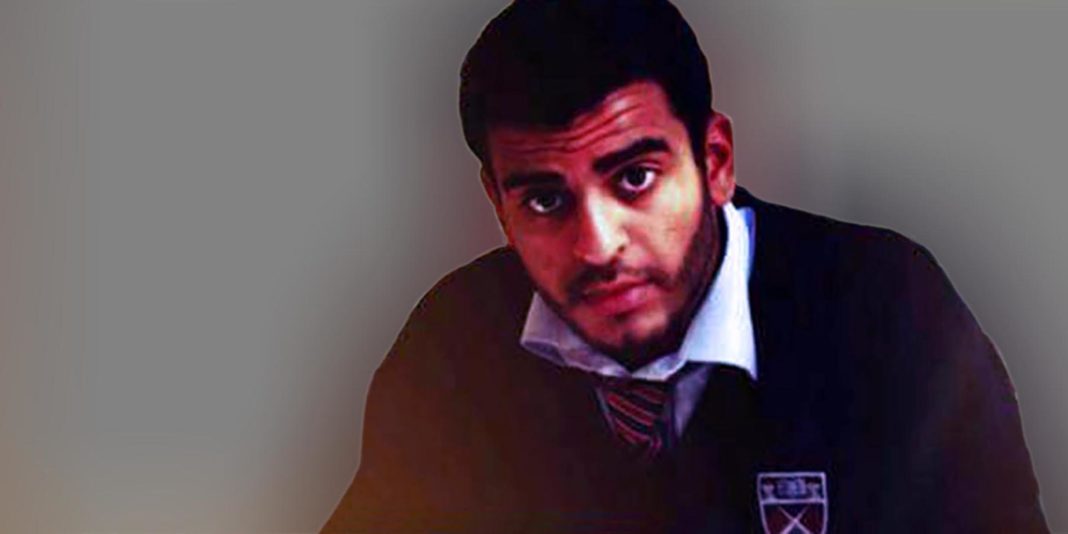An Irish citizen – a minor at the time of arrest – has been held without trial in an Egyptian jail for almost three years. It’s hard to avoid the conclusion that we might be more concerned if he fitted more closely our traditional idea of “Irish”, writes Donal O’Keeffe.
Last week, in a prison letter responding to questions from The Times Ireland Edition, Ibrahim Halawa described the torture he has suffered and the violence he has been forced to witness in his almost three years as a prisoner held without trial in Egypt.
“There are many ways I have been mistreated: cursing, beatings, solitary confinement… Cursing is the least [serious] and [most] normal. They curse your father and mother. If you object it turns into a beating. Beating is a general title. I have been beaten with a plastic plumbing bar, slapped, punched, kicked and dragged.
“They torture another prisoner and they make you watch. They bury him in garbage and he isn’t allowed to move. Crucify men. They hold a man’s arm against the kerb and you hear it break when they kick it. A man is tied to a tree with honey all over him for insects to gather on him. A man is hung from a basketball hoop and beaten while hanging in the air. And a lot more.”
Ibrahim Halawa – who has been deemed a prisoner of conscience by Amnesty International – is an Irish citizen. He was born in The Coombe in Dublin and lived all his life in Ireland. He speaks Irish and plays GAA. Ibrahim was 17 years old and had just completed his Leaving Cert when he and his family visited relatives in Egypt. (Ibrahim later came to wish he had travelled with friends – as had been his initial plan – to Spain for the summer.)
Being an Irish citizen, Ibrahim Halawa had to pay for a visa to enter Egypt. That’s an important point. An Egyptian national would not have needed a visa.
When Ibrahim and his sisters became involved in a protest against the ousting of Egypt’s democratically-elected president, Mohamed Morsi, they found themselves under fire from security forces and sought sanctuary in the Al Fath mosque.
Egyptian authorities claim that it was the protesters who shot at the security forces. Amnesty International had observers on the ground that day and says this claim is unfounded. Security forces further claim they were shot at from the minaret of the Al Fath mosque. A crucially important piece of information is that when Imbrahim and his sisters were arrested, they were found locked into the inner sanctum of Al Fath. This, according to Amnesty International, is an impossible distance, under hostile gunfire, from the minaret.
The security forces stormed the mosque and during that assault Ibrahim was shot in the hand. In the almost-three years since, his only treatment was given to him by a cellmate, by chance a doctor.
Ibrahim’s sisters were granted bail – apparently because they are women – and they were allowed to leave Egypt. They say their brother was stripped naked and beaten with chains before being charged – along with 493 other men – with murder, attempted murder and illegal protest. Murder and attempted murder are crimes punishable by execution under Egyptian law.
These charges are “a cut-and-paste charge applied to hundreds of other people” according to Amnesty’s Colm O’Gorman. “He is being detained purely for peacefully exercising his right to freedom of expression and freedom of assembly.”
A recurring claim on the internet is that Ibrahim Halawa tore up his Irish passport. Not so, according to Amnesty International. His passport was confiscated when he was arrested. In any case, I could tear up my passport right now and that wouldn’t make me any less Irish. Actually, I confess I can’t tear up my passport right now, as I can’t find it. It’s probably in a drawer. I’m pretty sure I’m still Irish, though, especially seeing as I display two of the most Irish of traits, carelessness and untidiness.
“He’s not Irish” is another claim. Untrue. Ibrahim Halawa is an Irish citizen. What is at issue is that Egypt’s military dictatorship says he is an Egyptian national – because his parents are Egyptian – despite the fact that Ibrahim has never asserted Egyptian nationality. Under Irish law, Ibrahim is an Irish citizen. Again, if there was any truth to Egypt’s claim, they would hardly have charged him for the price of a visa every time he visited his cousins.
Another cry from members of the hard of feeling community is that Ibrahim Halawa is a terrorist. (The military junta which overthrew the democratically-elected government certainly says he’s a terrorist and they’d hardly lie, would they?) He was protesting for democracy. Hardly the actions of a terrorist.
Pale obsessives on the internet claim they have damning video footage proving Ibrahim is a member of the Muslim Brotherhood (which was Egypt’s democratically-elected government) and he wants to establish a Caliphate from the Levant to the Dingle Peninsula. When pressed, of course, they are never able to produce anything.
“The boy is basically not political at all,” an Irish official told The Irish Times last year. “He’s an Irish schoolboy. He likes sport, music. He writes rap music. He speaks with an ordinary Irish accent. Lovely fella.”
But, in truth, none of this matters.
Even if Ibrahim Halawa were in fact guilty of all the things the keyboard warriors claim, so what? Does a person’s entitlement to human rights cease once they have political opinions which differ from the mainstream? Is a person any less Irish because we don’t agree with them? If we can deny the rights of those we don’t like, then how are we in any way more enlightened than the military dictatorships and the religious fanatics we pretend to be better than?
You’d have to wonder at the half-hearted approach of the Irish Government to this case. The Department of Foreign Affairs says it is doing all it can, a claim which Amnesty International says it accepts. However, it should be noted that Canada’s Prime Minister Stephen Harper and Australia’s Prime Minister Tony Abbott successfully lobbied President el-Sisi to release their citizens. Where is our own prime minister on this?
An Irish citizen is held without trial in horrific conditions for over 1,000 days, his trial postponed thirteen times and he claims he has been tortured. His legal team says they have no proper access to him and he faces the death sentence if convicted. Is this a case of “Paddy likes to export live cattle to Egypt”? A spokesperson for the Taoiseach last year said the Taoiseach is “across the situation”. Is the Taoiseach across picking up the phone and asking el-Sisi to release an Irish citizen?
And it’s not just Enda. The response of the Irish public has been strangely muted too. It’s hard not to suspect that we might be a bit more exercised if Ibrahim Halawa fitted more closely with our traditional notion of what being Irish means.
Perhaps to Irish eyes, Ibrahim Halawa’s crime is that he’s a bit too Muslim and a bit too brown.
Please, prove me wrong. Here’s a contact list of Oireachtas members. Do what the Taoiseach seems reluctant to do: pick up the phone.








